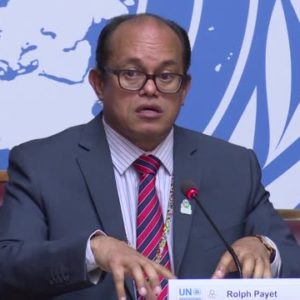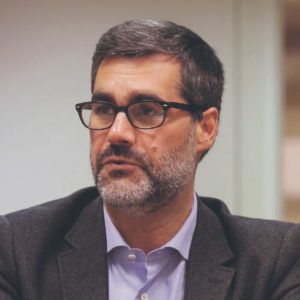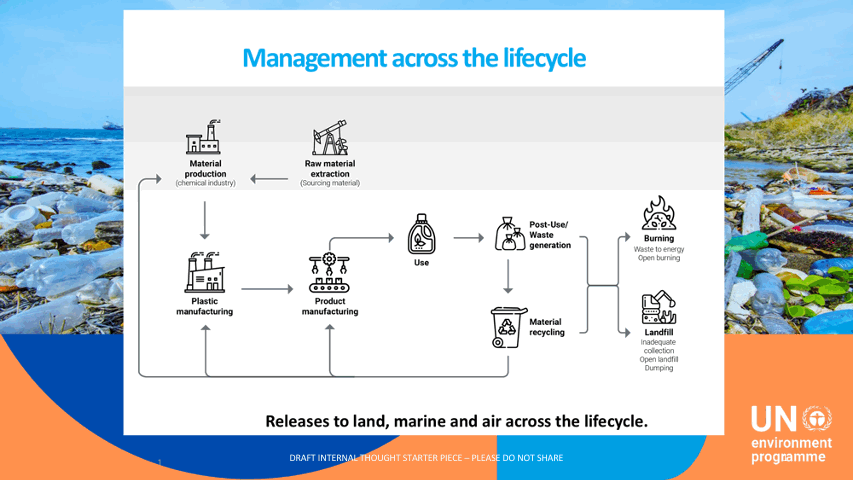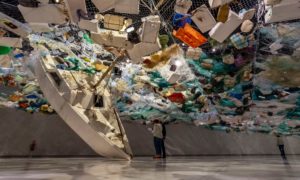Event Virtual
High-Level Dialogue on Plastic Governance | Beat Plastic Pollution
This High-Level Dialogue closes the first series of the Geneva Beat Plastic Pollution Dialogues, aiming to facilitate further engagement and discussion among the stakeholders in International Geneva and beyond. The dialogues addressed the plastic crisis and supported coordinated approaches that can lead to more efficient decision making.
About the Dialogues
The world is facing a plastic crisis, the status quo is not an option. Plastic pollution is a serious issue of global concern which requires an urgent and international response involving all relevant actors at different levels. Many initiatives, projects and governance responses and options have been developed to tackle this major environmental problem, but we are still unable to cope with the amount of plastic we generate. In addition, there is a lack of coordination which can better lead to a more effective and efficient response.
Various actors in Geneva are engaged in rethinking the way we manufacture, use, trade and manage plastics. The Geneva Beat Plastic Pollution Dialogues aim to create synergies among these actors, highlighting efforts made by intergovernmental organizations, governments, businesses, the scientific community, civil society and individuals in the hope of informing and fostering stronger cooperation and coordinated actions. The dialogues will also look at what the different stakeholders have achieved at all levels, present the latest research and governance options.
In addition, although the dialogues target stakeholders from all continents, they aim to encourage increased engagement of the Geneva community in the run-up to various global environmental negotiations, such as:
- UNEA-5 (1st and 2nd sessions) in February 2021 and February 2022
- BRS COPs in July 2021 and June 2022
- SAICM ICCM5 in 2022
This first series of dialogues ended in February 2021 to build momentum towards the first part of the fifth session of the UN Environment Assembly (UNEA-5.1). It aimed to facilitate further engagement and discussions among stakeholders and actors in International Geneva and across the regions and support coordinated approaches that can lead to more efficient global decision making. It also intended to provide a platform to further carry the discussion from the concluded Ad Hoc Open-Ended Expert Group (AHEG) on Marine Litter and Microplastics towards UNEA-5 part 2 in 2022.
The sessions made recommendations towards this High-Level Dialogue on Plastic Governance.
The dialogues and the high-level session are organized in collaboration with the Basel, Rotterdam and Stockholm Conventions Secretariat, the Center for International Environmental Law, the Global Governance Centre at the Graduate Institute, Norway, and Switzerland.
Sessions
- Opening Session: Plastics and Waste | 26 November 2020 | 9:00 CET
- Plastics, Climate and Air Pollution | 10 December 2020 | 14:00 CET
- Plastics and Human Rights | 14 January 2021 | 14:00 CET
- Plastics and Health | 21 January 2021 | 14:00 CET
- Plastics and Standards | 28 January 2021 | 14:00 CET
- Plastics and Trade | 4 February 2021 | 14:00 CET
- Plastics in the Life Cycle/SCP | 11 February 2021 | 14:00 CET
The High-Level Dialogue
The High-Level Dialogue on Plastics Governance took place on 11 March 2021 at 14:00 CET. It concluded the first series of dialogues which discussed various aspect of global plastic governance. This high-level dialogue considered the outcomes of this series and explore the way forward to UNEA 5.2, scheduled in February 2022.
Speakers
By intervention order

Susan GARDNER
Director, Ecosystems Division, UN Environment Programme

Rolph PAYET
Executive Secretary, Basel, Rotterdam and Stockholm Conventions

H.E. Amb. Tine MØRCH SMITH
Permanent Representative of Norway to the UN and other International Organizations in Geneva

Felix WERTLI
Head, Global Affairs Section, Swiss Federal Office for the Environment

H.E. Amb. Silvia Elena ALFARO ESPINOSA
Permanent Representative of Peru to the UN and other International Organizations in Geneva

Juliet KABERA (written statement)
Director General, Rwanda Environment Management Authority

Nuno LACASTA
Executive Board President, Portuguese Environment Agency (EU Council Presidency)

Marco LAMBERTINI
Director General, WWF International

Bruno POZZI (moderator)
Director, Europe Office, UN Environment Programme
Video
In addition to the live WebEx and Facebook transmissions, the video is available on this webpage.
Summary
Welcome and Introduction
Introduction to the Session | Bruno POZZI, UN Environment Programme
The world is facing a plastic crisis and the status quo is not an option. While many initiatives and governance responses have been developed to tackle this major environmental problem, we are still unable to cope with the enormous amount of plastic we generate. Discussions on how to better address the issue are ongoing in various duty stations and fora, including in Geneva, where various actors are engaged in rethinking the way we manufacture, use, trade and manage plastics.
The Geneva Beat Plastic Pollution Dialogues launched last November aimed at creating synergies among these actors and better highlighting processes, in the run-up to UNEA-5.1, and global environmental negotiations that taking place this year and next year. Many people have joined these events, including representatives from over 100 countries, 15 different UN and specialized agencies, NGOs, business organizations, the private sector, and academia.
Plastic Governance – The General Context
UNEA & Beyond | Susan GARDNER, UN Environment Programme
A few weeks ago, UNEA agreed on the need to address the three planetary crises: climate change, biodiversity loss and pollution. Marine litter and plastic pollution contribute to all three. Over the last decades, many actors have made progress to enhance awareness, further knowledge, and develop solutions. The progress made by the Ad-hoc Open Ended Expert group (AHEG) on marine litter and microplastics are particularly important, as people have came together to bring forward the evidence and galvanize political will.
The AHEG looked at the sources of plastic litter that end up in the oceans across the whole life cycle of plastics. The report delivered by AHEG identified some key areas for action:
- Promoting environmentally sound waste management through shared information, better access to technology, identification of best practices, and partnerships to build capacity across the board;
- Promoting responsible design and production to foster re-use, repair and recycling;
- Promoting sustainable consumption, with a particular emphasis on reducing single-use plastics where possible and provide alternatives to reduce the releases that go into the waste streams;
- Increase materials recycling by incentivizing markets, foster the inclusion of recycling consideration in the product design, and making information available.

The AHEG also considered the entire landscape of existing instruments and mandates so that whatever action is taken at the global level is in synergy with and complement existing efforts. The conclusion from the AHEG on the path forward indicate that:
- Continuing the status-quo is not option;
- While science-based approaches are essential to guide interventions, we currently have enough knowledge about the problem and its causes to start acting and engage in policy discussions;
- It will take no less than an all hands on deck approach, with innovation across government, private sector and society, and global measures that act in synergy with existing instruments at different levels;
- Market conditions, monitoring, as well as technical and financial assistance are essential to shift the game;
- Efforts to combat the problem should continue, and the perspective of a global agreement should not be an excuse for inaction now;
- Upstream and downstream solutions must be deployed together.
BRS MEAs | Rolph PAYET, Basel, Rotterdam and Stockholm Conventions
The Basel, Rotterdam and Stockholm Convention address the life cycle of chemicals and waste, and thus play an important role in the global initiatives to reverse the tide on plastic pollution. The Basel Convention has been at the fore front of the discussions through its progress on plastic waste. The Plastic Waste Partnership is now in full swing, with many actors in the private sector, governments, and NGOs contributing. The partnership has identified some critical areas which have been reflected in the outcomes of the Geneva Beat Plastic Pollution dialogues.
The adoption of the Amendments on plastic waste imply that all plastic waste and mixture of plastic waste generated by Parties of the convention will now be subject to the prior informed consent. The amendments came into force on 1 January 2021, and the Secretariat is working closely with governments to support implementation. The amendments promote responsibly and traceability. When countries take ownership of their waste and endorse the responsibility of waste management, it fosters strong government interventions and policies, engagement with private sector to improve waste management systems and incentivize recycling.
Waste management remains a challenge, but there is a number of successful examples that can be shared. The Basel Convention also launched a small grant programme to strengthen legal and institutional capacity of many developing countries, mobilizing around 10 million $USD over the last two years thanks the generosity of donors.
Meanwhile, significant work has also been carried forward by the Persistent Organic Pollutants Review Committee (POPRC) to consider a chemical additive used in plastics for UV protection under the Stockholm Convention. This chemical has been detected in remote areas as it travels through ocean and air, as scientific studies have revealed.

The BRS Secretariat is now looking ahead to the BRS meetings of the Conference of the Parties to the Conventions (COPs), which will be held in two parts with an online segment on 26-30 July 2021 and a resumed session in June 2022. The COPs should lead to further decision and actions on plastics, notably through the work of the plastic waste working group, and initiatives that governments will be putting forward for consideration.
The Geneva Beat Plastic Pollution Dialogues
Norway & the Dialogues | H.E. Amb. Tine MORCH SMITH, Norway
The Geneva Beat Plastic Pollution Dialogues showcased the global attention and willingness to plastic pollution. The series has brought the discussions further to address one of the fastest growing environmental crises of our time. Sharing knowledge, bringing out the latest updates from the scientific community, exploring solutions together, and assessing how to effectively act on a global level is crucial.
There is no vaccine against plastic pollution.
The Ad Hoc Open-Ended Expert Group established by UNEA completed their work last November and clearly underlined the urgency to act on this issue. At UNEA5.1, many voices spoke out in favor of a new global agreement. Germany, Ecuador and Ghana announced that they will host the first ever Ministerial Conference on marine plastic litter and plastic pollution this year, showcasing the existing willingness to make progress to tackle the environmental consequences of plastic pollution.
The plastic pollution problem is largely due to the lack of good governance. An important step forward to better regulate transboundary movement of plastic waste was taken by the Basel Convention of the Parties in May 2019. Strengthening the global response to plastics pollution is a key priority for Norway, whose ambition is to start negotiations of a global agreement to prevent plastic pollution at the UN Environment Assembly in 2022, by establishing an intergovernmental negotiation committee.
The Geneva Environment Network Beat Plastics Dialogue have a place in continuing to provide a meeting place for sharing knowledge, bring out the issues and explore important questions in support of the discussions. Yet, a new global agreement will not exist in a vacuum. As we progress in our preparations for the second part of UNEA5 in Nairobi February 2022, we will need all hands on deck!
Switzerland & the Dialogues | Felix WERTLI, Switzerland
Plastics are not a new emerging issue anymore. Since UNEA-1 recognized the global threat of marine plastic pollution in 2014, negotiations have been pursued and knowledge has been increased on governance and technical issues. Governments have tasked themselves to report on national, regional, and global barriers and respective response options, sharing their experience and best practices.
While many initiatives and processes are in place, they cannot provide a coherent, coordinated, efficient, and effective response to this global environmental concern.
In addition to the limitation by the geographical focus of existing processes, there is also a restriction with respect to what they are tackling along the life cycle of plastics. For the most part, initiatives and processes tackle one single element in the life cycle, and upstream measures are still lacking. Switzerland has raised this issue at the UNEA 5.1. and stated that it is high time to launch negotiations for a plastic convention and is looking forward to discussing at UNEA 5.2 the possibility to launch of such negotiations as well possible key elements of such a new framework.
An important aspect is that the new framework talks to strategic goals, implementation, supporting measures, compliance, and monitoring. It would have to adopt a life-cycle approach and include land-based sources, thus addressing many aspects including circular economy, production and design, consumption, re-use and recycling, chemical additives and microplastics, and waste management. Regarding the structure, such an agreement could consist of legally-binding but also voluntary components. Finally, it should consider how to cooperate and collaborate with existing instruments to avoid duplication and harness synergies.
A Binding Agreement – Next Steps / From UNEA-5.1 to UNEA-5.2
Follow-up to the AHEG – Peru Perspective | H.E. Amb. Silvia Elena ALFARO ESPINOSA, Peru
Peru is very vulnerable to the problem of plastic pollution, due to its location at the coast. The oceans in Peru are the home of an incredible number of valuable marine species. Peru’s connection with the oceans and its sustainable use and conservation is ancient. At present, Peru is the largest producer of fishmeal in the world. However, plastics harm wildlife, fisheries, tourism, recreational activities and threaten marine ecosystems.
Plastics represent around 10% of the approximate 20’000 tons of solid waste that Peru generates. On average, a citizen uses 30kg of plastics per year. The figures may have to be reassessed in light of the Covid-19 pandemic. The impacts of the pandemic go beyond the health sector, as it has profound socio-economic consequences, especially in developing countries, hindering the achievement of the Sustainable Development Goals (SDGs). Ways to manage the solid waste from personal protection equipment and other plastic products used more widely due to the pandemic needs to be considered.
Peru is taking measures to better manage its solid waste and reduce the use of plastic, including a law on integral management of solid waste and a law on single-use plastic bags and containers. The transition to a circular and eco-efficient economy is promoted through the national plan on competitiveness and productivity the signature of the agreement of the New Plastics Economy, and a roadmap toward circular economy. In addition, information campaigns have been developed to raise awareness on plastic pollution among citizens. Finally, Peru promotes cleaner production through agreements with the private industries linked to plastics.
However, since we face a transboundary problem, action at the national level has to be complemented by coordinated global solutions involving other governments, civil society, academia, the private sector, and the consumers. Peru participated in the AHEG on marine litter and microplastics, which provided concrete options to tackle the plastic problem. Numerous participants supported the option of a new global agreement on plastics.
Peru believes that the agreement should encompass measures to address all stage of the life cycle and including all relevant actors, consider both marine and terrestrial sources, promote circular economy and the sound management of plastic waste, include standards to assess the sustainability of materials and products, address sensitization and sustainable consumption, foster a just transition in alignment with the 2030 Agenda, use the science-policy interface, foster international cooperation, and include technical and financial assistance to developing countries. Peru will continue to engage constructively to achieve concrete results in the second segment of UNEA-5 in February 2022.
Events like this are pivotal in generating the consensus needed to move forward among all stakeholders on the need to address plastic pollution in the perspective of long-term goals and the establishment of new governance structures, such as a new legal agreement, that we believe are not contradictory but rather complementary to the current actions undertaken within the existing frameworks at the national, regional and global level.
Follow-up to the AHEG – Rwanda Perspective | Juliet KABERA, Rwanda
This message was presented by Bruno Pozzi on behalf of Juliet Kabera, who was unfortunately unable to attend the event. The full written statement is available here.
Rwanda was one of the first countries to take the revolutionary step to ban of plastic bags and specific types of packaging almost 15 years ago. The State has continued to address plastic pollution: in September 2019, a law that prohibits the manufacture, import, use and sale of plastic bags and single-use plastic items came into effect. Additionally, the Cleaner Production and Climate Innovation Center of Rwanda is supporting businesses in transition to alternatives.
Rwanda has been a very active member of the international community on this issue and is looking at the results of the AHEG as an important step towards UNEA5.2 in 2022. Insisting on the inherent transboundary nature of plastic pollution and the need to tackle it at its sources, Rwanda is pleased with the process that has been made to produce an international, legally binding instrument on plastic pollution. Rwanda wishes to encourage all nations to take immediate steps to limit the manufacture and use of single-use plastics and address plastic pollution, as we prepare a strong international agreement through an intergovernmental negotiating committee.
The Green Deal and Green Recovery Opportunities | Nuno LACASTA, Portugal (EU Council Presidency)
For the first time in a generation, we see several actors pushing governments to action on issues of climate and plastic pollution. Plastics is a cross-cutting topic which requires governments’ coordinated action, companies’ innovative impulses and public engagement.
The European Green Deal is the new economic roadmap strategy for the EU, but also the bedrock of the Covid recovery and resilience programme. Geared toward 2030, it allows an unprecedented alignment of different policies throughout the EU – on agriculture, finance, industry, environment, health, etc –, and at country level, through EU financing and regulatory instruments. It is intended that the EU’s climate and environmental challenges will become a unique opportunity to build an equitable, competitive, prosperous, and carbon-neutral society in which economic growth is decoupled from resources use.
An important set of initiatives is already in place, such as the single-use plastics legislation adopted in 2019. In 2020, the EU has been working on the investment plan for the EU Green Deal and the mechanism for just transition, the industrial strategy, the second version of the Circular Economy Action Plan, and the European Climate Pact. And in 2021, the EU adopted a proposal on a new climate adaptation strategy.
The Circular Economy Action Plan includes many initiatives to accelerate the transition to a new economic model focused on reuse, recycle, and revalue goods and services. Adopting a systemic approach is particularly important and we must deal with plastics throughout the life cycle. Under the banner of European Sustainable Product Policy, several initiatives deal specifically with plastics, including issues of packaging, recycled plastic content, release of microplastics, bio-based plastics, biodegradable and compostable plastics, and alternatives to single-use products.
Regarding the international dimensions of this challenge, it is heartening to see the multilateral environmental community engaging in this important topic. The EU, as an international reference on environmental standards and a leader in climate policy, is committed to lead on circular economy and plastics management. The EU’s action plans include action at the multilateral level, such as the launch of the Global Alliance for Circular Economy and Resource Efficiency. To support a global shift to a new paradigm, the EU is committed to reaching a global agreement on plastics and ensuring that free trade agreements reflect the objectives of circular economy.
While it is a challenging task, we believe this is no alternative.
There is great ambition to change consumption and production patterns, but equally multiple challenges. Therefore, it is crucial to have the involvement of all actors in the dynamics of transformation of our societies and economies.
A Binding Agreement | Marco LAMBERTINI, WWF International
The ocean is truly in crisis. Science has never been clearer about the unprecedented pressure on the oceans due to pollution, over-fishing, acidification, rising water temperature, deoxygenation, dead zones, deep sea mining. Two thirds of the oceans are being altered by human activities and 90% of commercial fish stocks are fully fished or over-fished. These facts should remind us that there is no room for complacency. We need solutions at scale and urgently.
The narrative around ocean health has evolved over the past years. The ocean crisis is now perceived not only as an ecological issue, but also an economic and humanitarian issue. With a GDP equivalent accounting for at least 2.3 trillion $USD per year, the blue economy would be the 7th largest economy in the world. The focus should be on how to make this economy sustainable, and plastic pollution is part of the challenge. The impacts of plastics on the oceans is increasing and may even be bigger than we imagine, as many dimensions are not fully known. In the last 50 years, we observed an 80% decline in fish stocks and an 100% increase in ocean plastics.
There is no silver bullet to resolve the issue. The complexity of the plastics value chains require that we adopt a holistic approach. We need a clear direction and set of time-bound targets on reduction, waste management, circularity, low footprints alternatives, and financial flows. We need a plan bringing together all actors and the great efforts that are undertaken and aligning them at the right level of ambition.
The increased recognition and support for the need of a global plastic pollution treaty is an exciting perspective. We can see from many governments and businesses convergence on convergence on what it should look like and the leadership role of UNEA in negotiations. We can celebrate a lot of success, but until we have a clear global goal that everybody agrees universally, we will continue to struggle to tackle this issue at the right level of ambition.
The global ministerial conference coming up this year could be a great opportunity for us to be ready for UNEA-5.2 and to send signals to the markets and businesses. We need accelerate this process and he time is mature to start now. The public demands it, governments and businesses are ready to embrace it, and WWF stands strong to support these efforts as well.
The world urgently needs a new binding treaty to combat plastic pollution. The new treaty can become the “north star and southern cross” that unites all efforts and guides us in the right direction, while restoring accountability in the plastics value chain. We call on all actors to immediately start to explore and develop the concrete elements of the new treaty. We have no time to waste.
Q&A
A recent UNCTAD study shows international trade in plastics is worth at least US$ 1 trillion annually. How can we ensure a new treaty addresses the need for international economic cooperation – including trade – to tackle plastic pollution and decarbonize the sector? What do you think that the WTO can do to contribute to the jointly efforts to beat plastics pollution?
Rolph Payet: When we think of plastics as a resource rather than waste, it becomes clear that plastics should be recycled, and many companies are moving in that direction. When we design new products, we should ensure that circularity is already embedded in them, so that they can easily be recycled. We need to ensure that technology – such as the one needed to separate different types of plastics – is available and affordable, especially as we push for investment in recycling.
Silvia: It is very important to see the multiple dimensions of any issue we try to address, and that is why the UN s trying to gather all the organizations when working on any issue. Therefore, in order to address plastics throughout its life cycle, we have to think of all the aspects, including trade, production, consumption and waste. We have to bring all the offices working on these specific issues together and to engage in discussions with governments and other relevant stakeholders. Trade has a role to play, and it has been touched upon at the WTO.
What are the panelists thoughts on single-use bio-sourced resins for plastics and the relevance of plastic products that have longer durability as an alternative to single-use plastics?
Nuno: A few additional points should be raised. Firstly, several campaigns to address plastics have paused because of the pandemic. We need to be mindful of that so that we do not go back. Secondly, combating plastics and circular economy needs to go hand in hand with decarbonization policy. We need to address the petrochemical industry and we need to engage in terms of alternatives. These industries are now in a very fast process of reinventing and reformulating chemical processes so as to be on board decarbonization policies. Thirdly on bio-based plastics, we are seeing the emergence of bioeconomy strategies, and this has a lot of potential for going forward.
Rolph: The range of interventions that can be done. Addressing single-use plastics is one very visible way of acting, as it directly connects with the consumers. But we also need to make progress in other areas, for instance in terms of food packaging and recycling systems to handle those.
Felix: The issue of plastics trade hints at the huge scale of the plastic economy. Thus, adopting a holistic approach and tackling all steps of the process is crucial, as previously noted. Further work should also be done so that people fully understand the costs of plastic pollution and non-action. The WWF and the Boston consulting group have also made the business case for the adoption of a global agreement. Indeed, such an agreement could help businesses to shift the trade to more sustainable products through clear guidance and foster innovation. With a stable legal framework, businesses can anticipate and thus easily adjust. We also need to foster the work on alternatives to ensure that we replace single-use products by products that are better.
Due to connectivity issues, Marco Lambertini was unable to answer questions.
Closing
Today’s dialogue has clearly shown that the status quo will not be accepted and that the time for action is now. The very valuable work done by the AHEG sets the scene for further action, political decisions, and a global agreement. We hope the dialogues held in Geneva and virtually have contributed to this call for action and for working together on an international agreement on plastic pollution. The journey over the past decade has led us to think that a global agreement is reachable and is feasible, as there’s enough willingness around the globe to do that. The science and technical knowledge is clear; it is time to be bold enough to make it happen.
Documents
- Invitation
- Remarks by Rwanda
- Presentation made during the events
- Outcomes of the Geneva Beat Plastic Pollution Dialogues (November 2020 – February 2021)
- Thematic outcomes of the Geneva Beat Plastic Pollution Dialogues
Waste | Climate & Air Pollution | Human Rights | Health | Standards | Trade | Life Cycle & SCP
Links
The update on Plastics and the Environment provides relevant information and the most recent research, data and articles from the various organizations in international Geneva and other institutions around the world.
- UNEP / UNEA | Ad hoc open-ended expert group on marine litter and microplastics
- Basel Convention | Plastic Waste
- A new global treaty to tackle plastic pollution? | Geneva Solutions | 1 March 2021
- Ghana to Host International Ministerial Conference on Marine Litter and Plastic Pollution | Ghana Ministry of Environment | 26 February 2021
- Confronting the Plastic Pollution Pandemic | IISD | 22 December 2020
- Convention on Plastic Pollution: Toward a New Global Agreement to Address Plastic Pollution | CIEL, Environmental Investigation Agency, GAIA, and #breakfreefromplastic | June 2020

